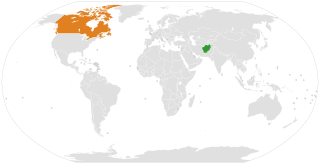The foreign relations of Afghanistan are in a transitional phase since the 2021 fall of Kabul to the Taliban and the collapse of the internationally-recognized Islamic Republic of Afghanistan. No country has recognised the new regime, the Islamic Emirate of Afghanistan. Although some countries have engaged in informal diplomatic contact with the Islamic Emirate, formal relations remain limited to representatives of the Islamic Republic.

In a referendum on 21 May 2006, the people of Montenegro opted to leave the State Union of Serbia and Montenegro. This result was confirmed with a declaration of independence by the Montenegrin parliament on 3 June 2006. It simultaneously requested international recognition and outlined foreign policy goals.

Relations between Afghanistan and the United States began in 1921 under the leaderships of King Amanullah Khan and President Warren G. Harding, respectively. The first contact between the two nations occurred further back in the 1830s when the first recorded person from the United States explored Afghanistan. The United States government foreign aid program provided about $500 million in aid for economic development; the aid ended before the 1978 Saur Revolution. The Soviet invasion of Afghanistan in 1979 was a turning point in the Cold War, when the United States started to financially support the Afghan resistance. The country, under both the Carter and Reagan administrations committed $3 billion dollars in financial and diplomatic support to the anti-Soviet Mujahideen forces. Beginning in 1980, the United States began admitting thousands of Afghan refugees for resettlement, and provided money and weapons to the Mujahideen through Pakistan's Inter-Services Intelligence (ISI). The USSR withdrew its troops in 1989.

Afghanistan and Canada established diplomatic relations in 1968. In 2003, Canada opened its embassy in Kabul and appointed its first resident ambassador. Afghanistan appointed its first resident ambassador to Canada in 2002. In August 2021, Canada closed its embassy in Kabul with the return of the Taliban to power in Afghanistan.

The Embassy of the Islamic Republic of Afghanistan in Washington, D.C. was the primary diplomatic mission of the Islamic Republic of Afghanistan to the United States. The building is located at 2341 Wyoming Avenue N.W. in Washington, D.C.'s Kalorama neighborhood. The chancery is built in the Colonial Revival style.

The Embassy of the United States in Beijing is the diplomatic mission of the United States in China. It serves as the administrative office of the United States Ambassador to China. The embassy complex is in Chaoyang District, Beijing.

Adela Raz is an Afghan politician who served as the last ambassador of the Islamic Republic of Afghanistan to the United States from July 2021 to February 2022. Raz was also the first woman to hold the office of Permanent Representative of Afghanistan to the United Nations.
An embassy without a government is a diplomatic mission that represents a deposed government to its host country. Such a mission usually arises from a civil conflict which leads to a regime change from an internationally recognised government to one or more new governments that may or may not be recognised when established for a variety or reasons.

The Taliban has ruled Afghanistan as the Islamic Emirate of Afghanistan since taking control by force in 2021, overthrowing the internationally recognized Islamic Republic of Afghanistan. The takeover was widely criticized by the international community, and no countries have extended diplomatic recognition to the new regime, despite nominally maintaining relations with Afghanistan. The Taliban has campaigned for international recognition since the takeover. Several countries have vowed never to recognize the Islamic Emirate, and others have said they will do so only if human rights in the country are respected. Some countries have accredited Taliban diplomats at the chargé d'affaires level despite not recognizing the Islamic Emirate. In September 2023, China became the first country to formally name a new ambassador to the country since the takeover, and in January 2024 recognized the Taliban's envoy to China; however, China still does not formally recognize the Taliban.







